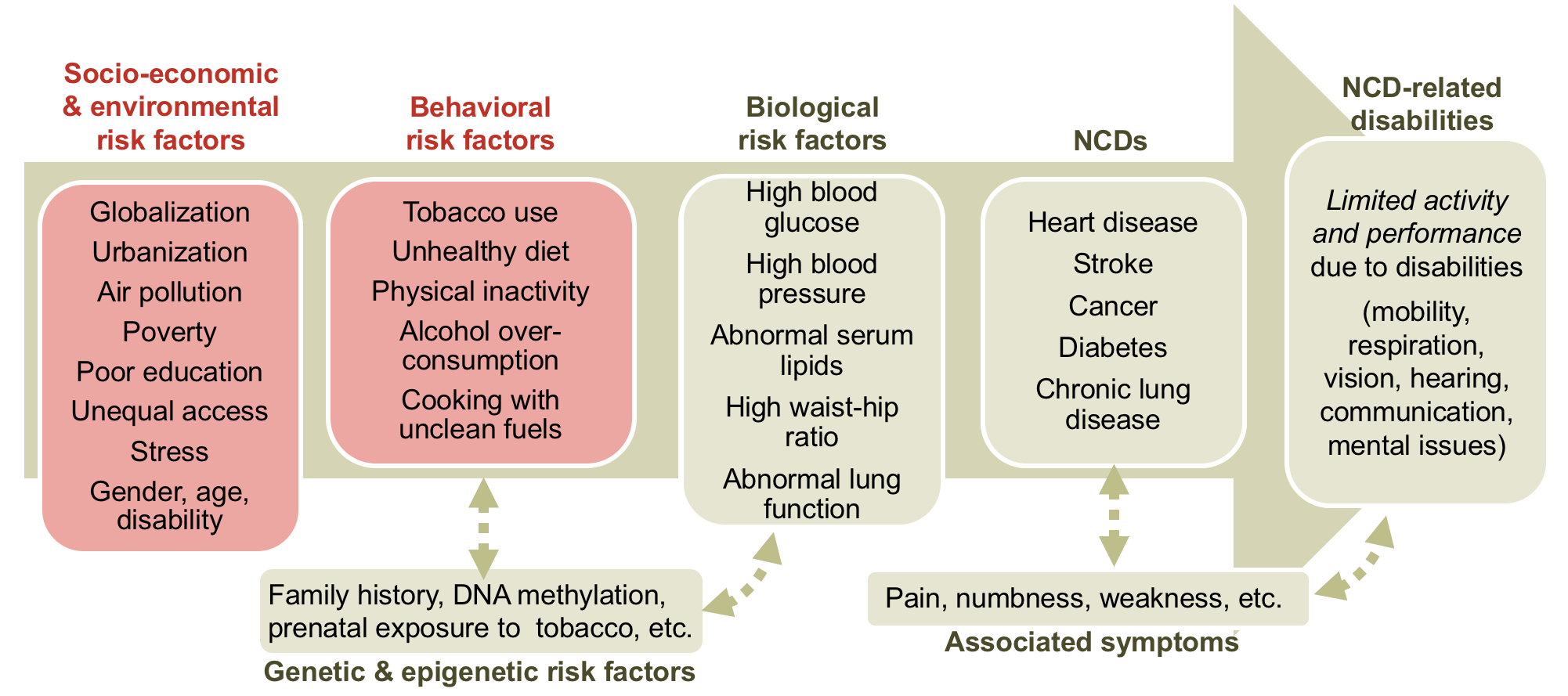-
GeneralGeneral
-
Non-Communicable Diseases Homepage


Introduction
Despite a focus on the control of communicable diseases in developing countries in the past, it is now apparent that non-communicable diseases have crept up on populations and created a major threat. This course aims to help practitioners understand the size of this threat and its causes, and develop policies to reduce the growing burden on developing countries' populations. We cannot cover all non-communicable diseases in this module and have chosen to focus on Cardiovascular Disease (CVD) and Diabetes. We hope that the learning from this module will help students appreciate the evidence base required to plan interventions to reduce the threat from these conditions.
The course is designed to help you:
- Understand the size and causes of NCDs, and to develop policies to reduce the growing burden on developing countries’ populations (with a focus on CVD and Diabetes).
- Appreciate the evidence base required to plan interventions to reduce the threat from these conditions.
This course is an Open Online Course (OOC) that has been adopted from Peoples-uni. It was further developed by NextGenU.org (NGU).
There are five (5) modules to complete, which include:
Module 1: Size of the Problem (Burden of Illness, Macroeconomics)
Module 2: Causes (Risk Factors, including Individual, Population and Socio-cultural Determinants)
Module 3: Appraising the Evidence that Underpins International Interventions and Prevention Programmes
Module 4: How Can We Make Health Policies to Reduce the Burden of NCD?
Module 5: Implementing Prevention Programmes (Plan Your Own)Approximate time for completion of this course is 18 hours and 30 minutes at an average reading rate of 144 words/minute.
Engaging with this course
- To register for this course, complete the registration form. Begin the course with Module 1. For each lesson, read the description.
- Each lesson comprises introductory remarks. You can click on the collections of resources in each module.
- There is a forum on each module for reflection, and you will be able to add a new topic or respond to a previous one. You may want to share your learning from this and other readings, comment on the topics from your own experience, comment on others' posts, or provide feedback on how we can improve the content and/or presentation.
- There is a final quiz to assess your understanding of some important concepts. Click on the hyperlinks to take you to these items in each topic.
Requirements to obtain the certificate
You may browse this course for free to learn for your personal enrichment. There are no requirements.
To obtain a certificate, a learner must successfully complete:
- All reading requirements
- All quizzes, passing with 80%, having unlimited attempts (consider that some courses do not have quizzes)
- All discussion forums
- The final exam with a minimum of 80% and a maximum of 3 attempts, and
- The self and course evaluation forms
Subscribe to our newsletter to be notified of future updates, new courses, and to be part of our community.
-
Module 1: Size of the Problem (Burden of Illness, Macroeconomics)
By the end of this Module, you should be able to understand the burden of disease from diabetes and cardiovascular disease from a public health perspective.
See this short video from WHO: Global Noncommunicable Disease Network, as an introduction:
1 Page, 1 Forum -
Module 2: Causes (Risk Factors, including Individual, Population and Socio-cultural Determinants)
By the end of this Module, you should have an understanding of the contribution of major risk factors, including socio-cultural factors, to the causes of diabetes and CVD.
This graphic Determinants and Chronic Conditions of NCDs (modified from Dans et al., 2011 by Medicus Mundi Switzerland) from Health Promotion and Health Literacy: Toward transformative action for non-communicable diseases is a nice summary of what you will find in the resources section below:
 1 Page, 1 Forum
1 Page, 1 Forum -
Module 3: Appraising the Evidence that Underpins International Interventions and Prevention Programmes
By the end of this Module, you should be able to assess the evidence that underpins international initiatives in the prevention and provision of care for diabetes and cardiovascular diseases including primary and secondary prevention programmes and between population-based and individual-based interventions.
1 Page, 1 Forum -
Module 4: How Can We Make Health Policies to Reduce the Burden of NCD?
By the end of this Module, you should be able to discuss how diabetes and CVD might be incorporated in a policy agenda relevant to developing countries.
1 Page, 1 URL, 1 Forum -
Module 5: Implementing Prevention Programmes (Plan Your Own)
By the end of this Module you should be able to consider the implementation of a strategy to implement a successful intervention programme to reduce the burden of illness for CVD or diabetes in your own setting.
1 Page, 1 URL, 1 Forum -
Course and Self Evaluation & Certificate
 In this section, you can provide feedback about this course to help us make NextGenU.org better. Once evaluations are completed, you will be able to download your Certificate of Completion.
In this section, you can provide feedback about this course to help us make NextGenU.org better. Once evaluations are completed, you will be able to download your Certificate of Completion.Click here give your feedback

